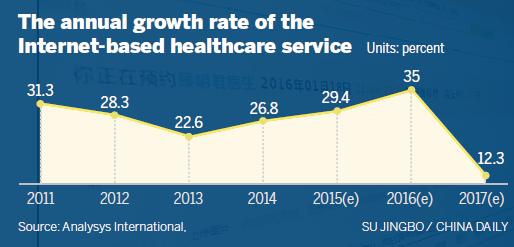
Haodf inked a deal with the municipal government of Yinchuan, capital of Ningxia Hui autonomous region, earlier this month to build an internet-based or online hospital that connects top-level doctors from big cities with patients and doctors in local clinics.
The system can work even better for re-diagnosis, given that experts can offer training and technical guidance to doctors in local clinics, who will then be able to properly treat patients, according to him.
Jiang of Analysys International said: "The two models are still nascent, but I am more optimistic about the high-end medical services market because of the enormous demand (for it). And patients of this group are more willing to pay (for such services)."
But Tian Junzhang, president of the Second People's Hospital of Guangdong province, thinks it is next to impossible to attract so many experts to offer online diagnosis.
"The more renowned a doctor, the less willing he or she is to treat a patient online because it is too difficult and risky to handle complicated diseases through the internet," he said, adding internet-based hospitals by nature are more suitable to deal with chronic diseases which require frequent re-diagnosis.
Huang Jinchang, director of the oncology department at the Beijing University of Chinese Medicine Third Affiliated Hospital, said, "The key to internet-based services is whether doctors can make accurate diagnosis based on the information they get from the internet and video calls."
Huang said time is not a factor because doctors can freely budget their time as long as they adopt an efficient way to treat patients. Currently, he spends 40 minutes to an hour every day answering questions that patients pose online.
"Online medical service is a growing trend. But it just complements face-to-face diagnosis, which is still the most efficient way. In the near term, I won't consider shifting to video diagnosis. After all, the technology is not that mature yet," he said.
In addition to technological bottlenecks, analysts said the issue of getting internet-based medical services covered by the National Medical Insurance System remains thorny, especially for prescription drugs sold online.
Ni Jianwen, vice-president of Alibaba's health business division, said in an interview with Caixin.com that due to the different regional policies, drug sales receipts sometimes are not accepted by local medical insurance authorities, creating difficulties for people buying medicine from online stores.


















































